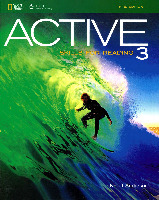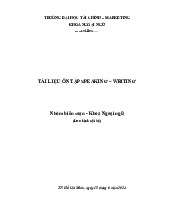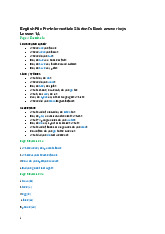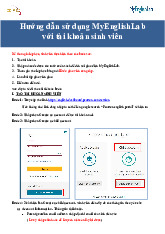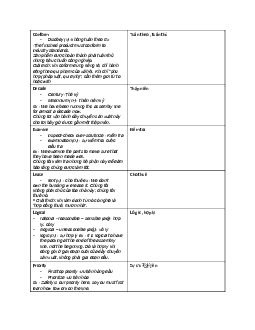





Preview text:
CONTENTS
Modals of ability and possibility 2
Modals of obligation and advice 3
Second conditional, would, could, and might 4
U7
THE PASSIVE
Thousands of movies are made every year.
The main character was played by Emily Blunt.
The book has been made into a movie.
He was being interviewed for the role when I called him.
Her new movie will be released later this year

MODALS OF ABILITY AND POSSIBILITY
can/can’t and could/couldn’t:
- can’t use with most tenses, structures, or modal verbs
- ability/posible to do something - verbs of the senses (hear, see,…) be able to: use with all tenses, forms, and with modal verbs
U8

TAG QUESTIONS
You don’t live in Chicago, do you?
Emma went to Harvard, didn’t she?
Your parents weren’t at the party last weekend, were they?
I’ll see you tomorrow at the concert, won’t I? You’ve never been to Canada, have you?
They should be here by now, shouldn’t they?
MODALS OF OBLIGATION AND ADVICE
have to:
- to talk about obligation and rules
- use in questions must:
- in very strong statements
- normally don’t use in conversation unless the obligation is very strong. - don’t usually use in questions.
U9
USES OF LIKE
I don’t like eating takeout.
Would you like a cup of tea?
Saul is just like his dad.
That sounds like a good idea.
What’s Japanese food like?
What does your new girlfriend look like?
-ING FORMS AND INFINITIVES
-ing forms after some verbs, including enjoy, feel like, finish, hate, keep, like, love, (don’t) mind, miss, prefer, recommend, spend time, suggest.
Infinitives after some verbs, including afford, agree, decide, expect, forget, help, hope, learn, need, offer, plan, promise, refuse, want.
U10
REPORTED SPEECH
He said that he knew where the burglar lived.
The police told us that they had arrested someone for the crime.
I asked Emma if she could help me with my homework.
The police officer asked me where I had been the night before.
- simple present → simple past
“I work in a bank.” → He said (that) he worked in a bank.
- present continuous → past continuous
“The train is arriving.” → Sara said (that) the train was arriving.
- present perfect → past perfect
“I’ve finished work.” → Mike told me (that) he’d finished work.
- simple past → past perfect
“I lost my keys.” → She said (that) she’d lost her keys. We report a Yes/No question with the following structure:
subject + asked + (object) + if + subject + affirmative verb form + rest of sentence. “Do you want ice cream?” → She asked (me) if I wanted ice cream.
“Is this your car?” → He asked (me) if it was my car.
When we report wh- questions, we include the question word(s) instead of if. “Why did you call me?” → She asked (me) why I had called her.
“When will you buy a car?” → They asked (us) when we would buy a car
SECOND CONDITIONAL, WOULD, COULD, AND MIGHT
Form: if + simple past, would + base form.
If I argued with my best friend, I’d be sad.
I’d visit you every year if you lived near the coast.
If I could speak Spanish, I’d go traveling in South America.
If I won the lottery, I might give all the money to charity. If I were you, I’d update my résumé.
U11
ARTICLES
Indefinite article (a/an)
We use a/an with singular, countable nouns:
- to talk about something or somebody for the first time.
Suddenly, a man ran out of the bank.
- to describe something or somebody.
It’s a beautiful building. She’s a really funny person.
- to talk about a person’s job.
He’s a computer programmer.
She works as an accountant.
- in frequency and measurement expressions.
- go to the gym twice a week.
He was driving at over 150 km. an hour.
Definite article (the) We use the:
- to talk about something we’ve already mentioned, or when it’s clear which particular thing or person we’re talking about.
- saw a man and a woman looking at a map.
The man asked me for help.
That restaurant looks nice, but the prices are very high. (This clearly means the prices in the restaurant.)
- when we use a defining relative clause to define a noun.
That’s the boy who stole my bike.
- when there’s only one of a thing.
The sun went behind the clouds.
- reserved our hotel on the Internet.
- with superlative adjectives and ordinal numbers (first, second, third, etc.).
She was the first person I met at the party.
- with the names of rivers, seas, oceans, and groups of islands.
London is on the River Thames.
We’re flying over the Pacific Ocean.
Last year I went to the Galápagos Islands.
- before countries that include the words United, Republic, and Kingdom, or are plurals.
I’d love to visit the U.S.
No article (zero article) We don’t use an article:
- to talk about things in general (with plural or uncountable nouns).
Houses are more expensive than apartments. (houses and apartments in general)
Sugar is bad for you. (sugar in general, and not the sugar in this packet) - with some places where we work, live, study, or do other specific activities, such as work, school, college, prison, church. We usually use them with no article after a preposition.
- stayed (at) home all day.
Chris is in college in Boston.
- before next/last + day, week, month, year, etc.
- saw him last week.
We’d like to stay in the same hotel next July.
- with most names of streets, towns, cities, countries, and continents.
He lives on Pine Street.
We’re going to New York next week!
- hope to visit Australia one day.
THIRD CONDITIONAL
Form: if + past perfect, would have+ V3.
If Emil hadn’t stayed out all night, his parents wouldn’t have been so furious.
I would have come to the party if I’d known about it.
If I’d studied more before my exam, I might have passed.
If you’d called me earlier, we could have gone out for dinner.
U12
SO/NEITHER DO I
“I love playing golf.” “So do I.”
“I’d love to visit New Zealand one day.” “So would I.”
“I’m not very good at chess.” “Neither am I.”
“I couldn’t go to class last week.” “Neither could I.”
“I haven’t done my homework.” “Really? I have.”
“I’m going on vacation next month.” “I’m not.”
MODALS OF DEDUCTION
- talk about something when we don’t know if it’s definitely true.
I can’t hear the children. They must be in bed.
I haven’t seen Lukas for a few days. He might be on vacation.
You might not like this new café. They only serve coffee, not tea.
Sandra’s not at work today. She may be sick.
It’s very noisy in the apartment upstairs. They must be having a party.
- use must + base form when we think that something is true.
- use can’t or couldn’t + base form when we are sure that something isn’t true. - use might or might not + base form when we think it’s possible that something is true, but we’re not sure.
- also use may or could + base form when we think something is possible. - often use the continuous form of the verb after modals of deduction when we talk about what we think is happening now.
Tom's not in the kitchen. He must be doing his homework in his bedroom. They can’t be playing soccer now – it’s nearly midnight!
She might be talking to David on the phone. He left a message for her this morning.
